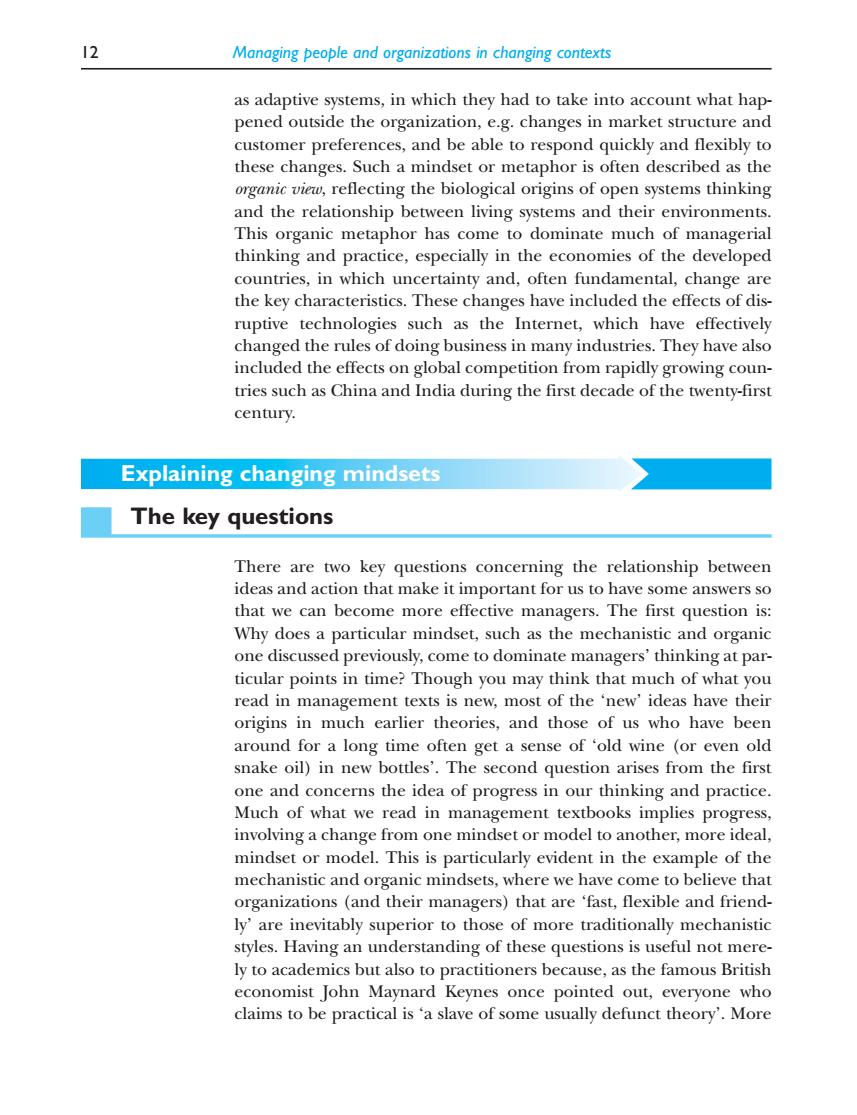正在加载图片...

12 Managing people and organizations in changing contexts as adaptive systems,in which they had to take into account what hap pened outside the organization,e.g.changes in market structure and customer preferences,and be able to respond quickly and flexibly to these changes.Such a mindset or metaphor is often described as the organic view,reflecting the biological origins of open systems thinking and the relationship between living systems and their environments. This organic metaphor has come to dominate much of managerial thinking and practice,especially in the economies of the developed countries,in which uncertainty and,often fundamental,change are the key characteristics.These changes have included the effects of dis ruptive technologies such as the Internet,which have effectively changed the rules of doing business in many industries.They have also included the effects on global competition from rapidly growing coun- tries such as China and India during the first decade of the twenty-first century. Explaining changing mindsets The key questions There are two key questions concerning the relationship between ideas and action that make it important for us to have some answers so that we can become more effective managers.The first question is: Why does a particular mindset,such as the mechanistic and organic one discussed previously,come to dominate managers'thinking at par- ticular points in time?Though you may think that much of what you read in management texts is new,most of the 'new'ideas have their origins in much earlier theories,and those of us who have been around for a long time often get a sense of 'old wine (or ven old snake oil)in new bottles.The second question arises from the first one and concerns the idea of progress in our thinking and practice Much of what we read in management textbooks implies progress involving a change from one mindset or model to another.more ideal. mindset or model.This is particularly evident in the example of the mechanistic and organic mindsets,where we have come to believe tha organizations (and their managers)that are 'fast,flexible and friend- ly'are inevitably superior to those of more traditionally mechanistic styles.Having an understanding of these questions is useful not mere ly to academics but also to practitioners because,as the famous British economist John Maynard Keynes once pointed out,everyone who claims to be practical is'a slave of some usually defunct theory'.More as adaptive systems, in which they had to take into account what happened outside the organization, e.g. changes in market structure and customer preferences, and be able to respond quickly and flexibly to these changes. Such a mindset or metaphor is often described as the organic view, reflecting the biological origins of open systems thinking and the relationship between living systems and their environments. This organic metaphor has come to dominate much of managerial thinking and practice, especially in the economies of the developed countries, in which uncertainty and, often fundamental, change are the key characteristics. These changes have included the effects of disruptive technologies such as the Internet, which have effectively changed the rules of doing business in many industries. They have also included the effects on global competition from rapidly growing countries such as China and India during the first decade of the twenty-first century. Explaining changing mindsets The key questions There are two key questions concerning the relationship between ideas and action that make it important for us to have some answers so that we can become more effective managers. The first question is: Why does a particular mindset, such as the mechanistic and organic one discussed previously, come to dominate managers’ thinking at particular points in time? Though you may think that much of what you read in management texts is new, most of the ‘new’ ideas have their origins in much earlier theories, and those of us who have been around for a long time often get a sense of ‘old wine (or even old snake oil) in new bottles’. The second question arises from the first one and concerns the idea of progress in our thinking and practice. Much of what we read in management textbooks implies progress, involving a change from one mindset or model to another, more ideal, mindset or model. This is particularly evident in the example of the mechanistic and organic mindsets, where we have come to believe that organizations (and their managers) that are ‘fast, flexible and friendly’ are inevitably superior to those of more traditionally mechanistic styles. Having an understanding of these questions is useful not merely to academics but also to practitioners because, as the famous British economist John Maynard Keynes once pointed out, everyone who claims to be practical is ‘a slave of some usually defunct theory’. More 12 Managing people and organizations in changing contexts